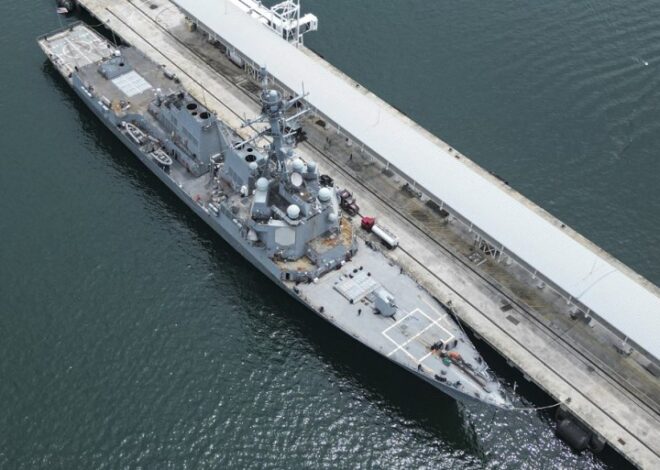Trump tells NATO members they must move first on Russia sanctions over Ukraine

Trump Urges NATO Allies to Act on Russia Sanctions Over Ukraine
On September 12, 2025, President Donald Trump departed from New York City aboard Marine One, heading to his golf resort in Bedminster, New Jersey. During his travels, he made headlines by addressing NATO members regarding the ongoing conflict in Ukraine and the need for collective action against Russia.
Call for Unified Sanctions
In a social media post, Trump communicated a clear message to NATO countries: he would only impose new sanctions on Russia if they first ceased purchasing Russian oil. He stated, “I am ready to do major Sanctions on Russia when all NATO Nations have agreed, and started, to do the same thing, and when all NATO Nations STOP BUYING OIL FROM RUSSIA.” This message was framed as a letter directed not only to NATO allies but also to the global community.
Trump’s approach comes amid increasing pressure from certain factions within his own party, urging him to take a firmer stance against Russia, especially as diplomatic efforts to resolve the conflict have stalled. The situation has escalated recently, with Russian drones entering Polish airspace, prompting NATO fighter jets to intercept and shoot them down. While Trump acknowledged the incident, he suggested it might have been accidental but noted that his patience with Russia was waning.
Economic Implications of Sanctions
In the past month, Trump has taken significant economic actions, including doubling tariffs on Indian goods to 50 percent due to India’s continued purchases of Russian energy. His recent discussions with European leaders underscored the need for a united front against Russian oil purchases to increase pressure on Russian President Vladimir Putin.
According to a White House official who requested anonymity, Trump emphasized to European leaders during a private call that cutting off Russian oil was essential for leveraging greater influence over Putin to end the war. His social media post echoed these sentiments, criticizing NATO’s commitment and highlighting the detrimental impact that ongoing oil purchases have on the alliance’s negotiating power.
The Energy Landscape in Europe
The European Union (EU) has historically been reliant on Russian energy, particularly before the invasion of Ukraine in 2022. Although the EU has taken steps to reduce its dependence on Russian oil and gas, complete cessation of purchases has proven challenging. The Centre for Research on Energy and Clean Air, a Finnish nonprofit organization, has reported that the EU remains the largest buyer of both Russian liquefied natural gas (LNG) and pipeline natural gas. Additionally, Turkey, a NATO member, continues to be a significant buyer of Russian energy.
The hesitance among NATO countries to impose strict energy sanctions stems from concerns about potential repercussions on the global economy. Any sudden disruptions in energy supplies could have far-reaching effects, especially for European nations that have yet to fully diversify their energy sources.
A Broader Trade Strategy
In his social media post, Trump also called for NATO countries to impose hefty tariffs on Chinese goods, suggesting rates between 50% and 100%. This proposal arises from China’s position as the leading buyer of Russian oil in the wake of the Ukraine conflict. Trump argued that imposing these tariffs would diminish China’s influence over Russia, stating, “China has a strong control, and even grip, over Russia, and these powerful Tariffs will break that grip.”
This sentiment aligns with recent discussions among U.S. officials, including Treasury Secretary Scott Bessent and U.S. Trade Representative Jamieson Greer, who engaged with G7 finance ministers to advocate for a unified effort to cut off revenues to Russia. They emphasized that only through collective action could the international community hope to bring an end to the war in Ukraine.
Congressional Support for Sanctions
Within Congress, there is growing bipartisan support for enhancing sanctions against Russia. South Carolina Republican Senator Lindsey Graham has been vocal in urging Trump to adopt a more aggressive economic strategy. In July, Graham, alongside Connecticut Democratic Senator Richard Blumenthal, introduced a sanctions package aimed at increasing pressure on Russia. Following the recent drone incident in Poland, Graham took to social media to encourage Trump to endorse this legislative effort, stating, “Mr. President, Congress is with you. We stand ready to pass legislation authorizing bone crushing new sanctions and tariffs that can be deployed at your discretion.”
As the situation in Ukraine continues to evolve, the dynamics within NATO and the broader international community will play a critical role in shaping the response to Russian aggression.
Key Facts
– President Trump stated he will only impose new sanctions on Russia if NATO countries stop buying Russian oil.
– Trump emphasized the need for NATO unity in applying pressure on Russia.
– NATO fighter jets recently shot down Russian drones that entered Polish airspace.
– The EU remains heavily reliant on Russian energy, complicating sanctions efforts.
– Trump called for 50% to 100% tariffs on Chinese goods to weaken China’s influence over Russia.
– Bipartisan support in Congress is growing for increased sanctions against Russia.
Source: www.npr.org


